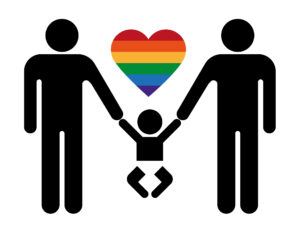Is IVG The Answer To LGBTQ+ Parentage Legal Problems?
The technology has already been tried -- with success -- on lab rats. Can human application be far behind?

(Image via Getty)
Medical technology can take gigantic leaps forward. Among those never-before-imagined bounds is the successful development of in vitro gametogenesis (“IVG”). What’s IVG? It’s where scientists take skin cells and turn them into reproductive sperm or egg cells. The reproductive cells, or gametes, are then combined to form embryos that result in successful pregnancies and births.
Is that really possible? Well, last month, as a result of these reproductive technology advancements, we received news of the birth of children from two biological males! In rats, that is. But how soon until the technology can be used with human reproduction?

Navigating Financial Success by Avoiding Common Pitfalls and Maximizing Firm Performance
This Is Happening … And Soon
My podcast co-host Jennifer White and I recently interviewed fertility expert and Harvard professor Dr. Kathryn Go, and discussed her predictions for the future of reproductive technology. When it came to IVG, Dr. Go predicted that the technology would be a part of human reproduction in the near term. Think closer to five years than 20 years. That’s soon!
What are some of the legal implications for the potential massive shift in fertility treatment options?
Increased Possibility Of Being A Genetic Parent
Sponsored

Navigating Financial Success by Avoiding Common Pitfalls and Maximizing Firm Performance

Legal AI: 3 Steps Law Firms Should Take Now

Is The Future Of Law Distributed? Lessons From The Tech Adoption Curve

Is The Future Of Law Distributed? Lessons From The Tech Adoption Curve
Donor sperm, egg, and embryos are staples of current fertility treatment options. Many people find themselves without sperm or eggs able to result in a healthy pregnancy or baby. Others are without a partner (whether single or in a same-sex couple), and don’t produce the necessary complimentary gametes. These situations have led to a heavy reliance on sperm donors, egg donors, and, more recently, embryo donors.
But with gamete donations come plenty of legal issues and fears. What if a donor changes their mind, and wants to claim parental rights for the child? Or if a donor claims to be a neuroscience Ph.D. student, but is really a college dropout with a felony record and significant mental health conditions? Or if a donor has already donated prodigiously … and secretly has over 500 children? Completely theoretically speaking, of course.
Law professor Naomi Cahn of the University of Virginia School of Law explained that IVG promises the “means of producing an unlimited supply of sperm and eggs genetically related to the intended parents. This possibility could largely eliminate the need for donors to provide gametes for use in assisted reproduction.” Cahn also states that it might thus result in fewer complications, such as those relating to the determination of legal parentage or disclosure of donor identities. Of course, she notes, IVG is just the first step of reproduction. Gestation is still required. And IVG raises multiple ethical and equity concerns.
Parentage Problems Reduced
The risk for LGBTQ+ parents has been an ongoing one, as more cases involve judges denying parental rights to a nongenetically related parent. With IVG, same-sex couples would no longer need to rely on a donor or be forced to choose which parent gets to be related to their child. Both can be. And while LGBTQ+ legal discrimination may not be eliminated, the genetic connection to both parents, and no other person, would make it much harder as a practical matter for a judge to deny parental rights to either parent.
Sponsored

Generative AI In Legal Work — What’s Fact And What’s Fiction?


The Business Case For AI At Your Law Firm

Ethical Concerns
Of course, with any new technology, especially in the reproductive technology space, ethical considerations should be considered in depth. IVG, which, like IVF, results in embryos outside of the human body, carries with it familiar medical ethics concerns.
In good news, for proponents, some of the early analysis is supportive of the use of IVG, and not only for opposite-sex couples. Consider this article in Bioethics by Lauren Notini, Christopher Gyngell, and Julian Savulescu. While the authors reject the use of IVG as acceptable for solo reproduction due to the significant chance of profound genetic abnormalities, they are supportive of use for same-sex couples. In fact, the authors point to analyses of historical injustices that may give reason to preference some groups over others. “This point is strongly made by Timothy Murphy: ‘It’s plausible in some ways that same-sex couples are owed research priority towards securing shared genetics in their children simply as a matter of access and equality and also — more searchingly — as a matter of compensatory justice, for past road blocks imposed against having children.’”
While IVG is still, for a few more moments, theoretical for human reproduction, this is the best time to work out the ethical and legal questions, and hopefully be in a position to responsibly embrace the new technology and the possibilities it brings.
 Ellen Trachman is the Managing Attorney of Trachman Law Center, LLC, a Denver-based law firm specializing in assisted reproductive technology law, and co-host of the podcast I Want To Put A Baby In You. You can reach her at babies@abovethelaw.com.
Ellen Trachman is the Managing Attorney of Trachman Law Center, LLC, a Denver-based law firm specializing in assisted reproductive technology law, and co-host of the podcast I Want To Put A Baby In You. You can reach her at babies@abovethelaw.com.







